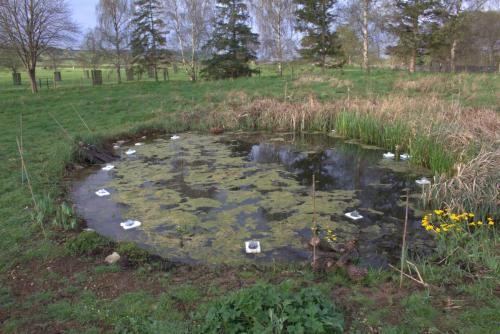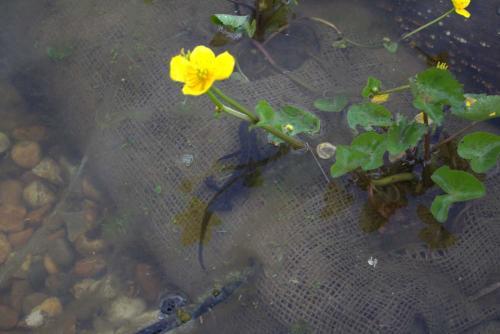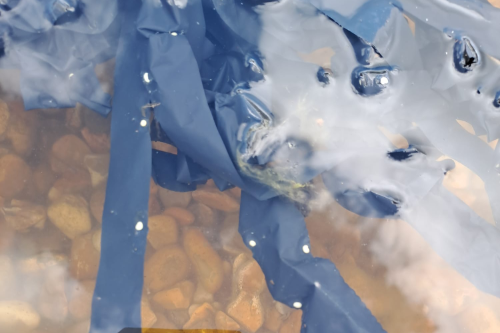National Newt Day
News
BSU celebrates National Newt Day
Thursday, 24 April, 2025In 2024, Bath Spa University established the world’s first National Newt Day. Taking place on 24 April each year, National Newt Day brings attention to providing suitable habitat for Great Crested Newts and other newts living in the UK. It aids in preventing their decline, offering information on what to do if you find them and the risks of improper handling and disturbing their habitat.
Newton Park is home to all of the UK’s native species: Smooth, Palmate and, most notably, a thriving population of Great Crested Newts. During this time of year, as temperatures get warmer, BSU’s resident newts begin moving to ponds for the breeding season and Newton Park becomes a living lab where students can take advantage of the natural ecosystem to survey and monitor wildlife.
This year BSU is conducting six surveys involving two visits each and employing different methods. Because the newts are most active at night, in the evening after dark torches are used to search for newts in the ponds and bottle traps – funnels that newts swim into and can't get out of until they are released – are set. In the morning, the bottle traps are checked and any newts in them are recorded according to species and sex.

Finally, the plants in the ponds in the Walled Garden, the Italian Garden and next to the playing field are checked for eggs. Female newts lay their eggs on leaves that they then fold around the egg to protect it.
The surveys are carried out every year, giving a snapshot of BSU’s newt populations to check that all is well. Another survey will be conducted on Thursday evening – a proper celebration of National Newt Day.
Dr Ralph Thompson, Senior Lecturer in Zoology and Programme Leader for BSc Willdlife Conservation, said:
“These surveys give our students an opportunity to work hands-on with the newts which we can only do with a licensed ecologist. The aim is to get an estimate of newt populations on campus to inform planning applications and decisions. This kind of survey is less common than it used to be because it has been largely replaced by environmental DNA sampling, so it is a rare opportunity to learn.”
BSU’s Grounds Team also plays an important role in supporting the University’s newt population by maintaining their habitats and getting the ponds and surrounding areas ready for them as the breeding season approaches.
The ponds are cleaned out over the winter period to reduce overgrowth of vegetation, which ensures there are areas of open water for male newts to do their courtship displays.

Grounds Team Manager Penny Snowden said:
“One of the ponds near the sports field was very overgrown and we had an excavator in to remove the big reeds which were covering most of the pond. We left vegetation in the other half so it was not completely empty and then re-planted with the type of plants that newts like to lay their eggs on, such as water mint and forget-me-not.”
To ensure there were enough egg laying sites while the new vegetation was embedding, the team also deployed some shredded bin bags which act as artificial egg laying sites. Penny added:
“Eggs were found on them just after we put them in the pond, which is good news. The artificial sites will be removed once the season is over and by next year the plants will have grown enough to provide natural egg laying spots. The newts are very particular about the type and size of leaf they need. They lay a single egg and curl the leaf over it to protect it, which is very clever!”

The eggs will hatch into baby newts which are known as “efts”. At the end of the season, the now fully-grown adult newts will make their way out of the ponds through longer vegetation, which is also maintained by the Grounds Team, so they don't get spotted and eaten. They will then spend the winter in damp leaf litter and log piles in the woodland, before the cycle begins anew next Spring.
Though newts are the main stars of the day, the team’s work is also helping to support other creatures who call Newton Park home. Ralph said:
“This morning we found ten slow worms and two grass snakes in the area around the newt ponds, showing that the habitat designed for the newts is also helping other wildlife.”
Are you passionate about newts (or other wildlife) and the environment? Check out our life sciences courses. You can also keep up with our amazing Grounds Team on Instagram.